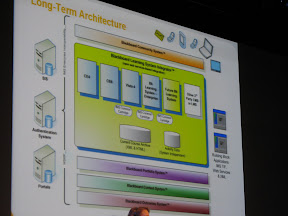Shock of the Old 2008 – Instalment 1
 Well, another week another web technology focused conference another broken WiFi network. I managed to get online for a total of 10 minutes so no live blogging from this conference.
Well, another week another web technology focused conference another broken WiFi network. I managed to get online for a total of 10 minutes so no live blogging from this conference.
Stuart Lee (Oxford) kicked off with a very entertaining introduction to the day with some informed jokes and a healthy dose of web 2.0 scepticism. I guess the main question really was how relevant web 2.0 is to mainstream higher education teaching in the UK. Can we stick our heads in the sand and hope it’ll go away? Do we want to?
In a way this was a very refreshing point of view as I was beginning to beleive I was quite out of step. If I was to believe many of the blogs out there we should be well on the way to planning, if not developing, personal learning environments based on every web 2.0 application site available. Especially if it involves Twitter (Facebook is Old Hat). Anyway, this was an energising start to the day.
The keynote speaker for the day was Professor Ronald Barnett from the Institute of Education. He lent academic weight by looking at what it is to be a student in the digital age and reminding us of the aims of higher education and posing many tough questions regarding the use of digital technologies. His ultimate conclusion is that there are so many unanswered questions that we barely understand the value of digital technologies because we barely understand our educational aims in higher education. We cannot therefore assume that digital technologies will be worthwhile and assessment of them is problematic. This does however mean that there are real opportunities for research. One nice comment that came out of the questions, was that enabling the student to enjoy themselves while attending a course does not necessarily mean that they are effective learners. As educators we sometimes have to take our students to uncomfortable places so that they can potentially transform their knowledge and attitudes to go into the presently unknown.
Niall Sclater from the Open University was next to speak regarding the perceived threat to the VLE from the PLE. He started off with a devil’s advocate approach by questioning whether we should be investing time and energy into developing our use of VLEs when there is all that free Web 2.0 software out there that we could and should be using. He then went on to look at the various PLE models out there. The main arguments against the PLE are the inability to brand, integration difficulties (very important to the Open University), reliability questions, accountability and other questions over the separation of the education and social space. Another query was whether the PLE model will fit the formal learning approach of universities as opposed to a more informal approach. Unsurprisingly, Niall’s conclusion was that we still need the VLE – his preferred model is to use his laptop as a PLE which links all these applications and services together.
More to follow…
‘Said Business School’ photo courtesy of dipfan from Flickr.com (licensed under Creative Commons)







